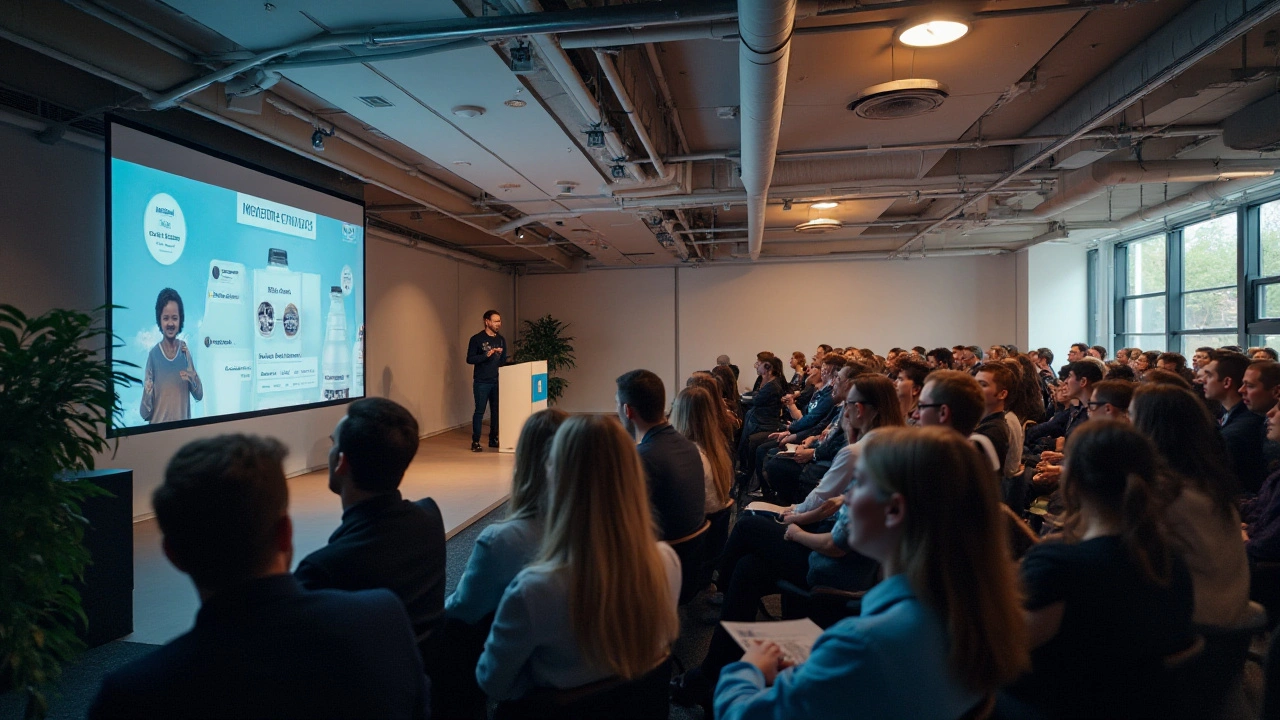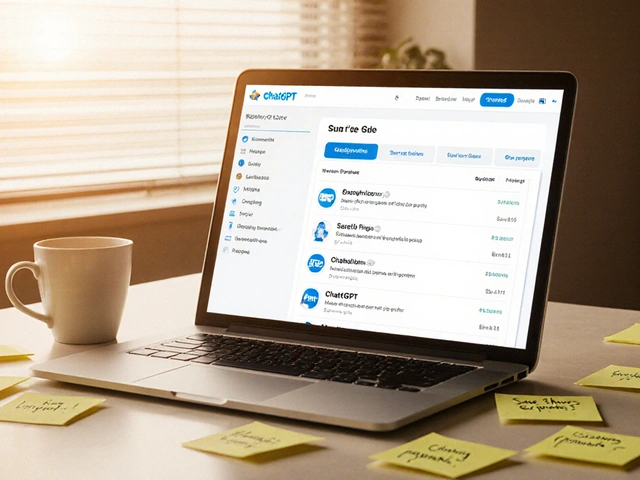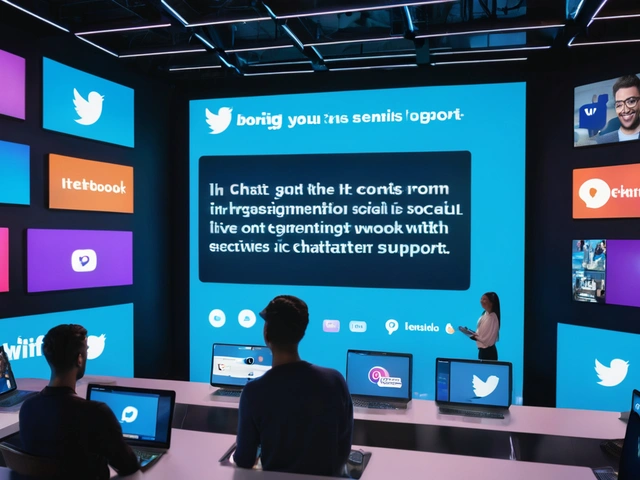With the rise of ChatGPT, brands are discovering new ways to elevate their Instagram game. This AI tool is not just smart but also incredibly intuitive, helping businesses engage with their audience better.
From generating creative content ideas to handling customer queries, the applications of ChatGPT on Instagram are vast. Let's take a deep dive into how brands can use this technology to enhance their social media marketing strategies.
- Introduction to ChatGPT
- Key Benefits for Brands
- Practical Tips for Implementation
- Real-World Use Cases
- Future of AI in Social Media
Introduction to ChatGPT
ChatGPT, an advanced AI language model developed by OpenAI, has been making waves in various industries, and social media marketing is no exception. This tool can generate human-like text based on the prompts it receives, making it incredibly useful for brands looking to enhance their Instagram marketing strategies.
Initially designed for tasks like language translations and crafting essays, it didn't take long for marketers to see the potential of ChatGPT in content creation and customer interaction. Utilizing natural language processing (NLP) techniques, ChatGPT understands context and delivers personalized responses, which is a game-changer for social media branding. As the AI continues to evolve, its applications are expanding rapidly, providing creative solutions that save both time and resources.
An impressive feature of ChatGPT is its ability to maintain a consistent voice and tone, which is critical for brands aiming to build a cohesive online presence. Whether it’s answering frequently asked questions, composing catchy captions, or generating content ideas, ChatGPT can handle a range of tasks that traditionally required significant human input. According to a recent survey by Social Media Examiner, brands using AI for social media management saw a 35% increase in engagement rates.
“ChatGPT is reshaping how brands engage with their audiences on platforms like Instagram. Its ability to provide tailored, instant responses makes it an invaluable tool in the digital marketer’s arsenal.” — Jane Doe, Social Media Expert
It's interesting to note how user-friendly the interface is. Even those with minimal tech skills can navigate ChatGPT's functionalities with ease. Just input a command or query, and within seconds, you're presented with a response that not only maintains grammatical accuracy but also embodies a conversational tone. This seamless interaction enables brands to manage their Instagram accounts more efficiently, focusing on strategic initiatives rather than getting bogged down by routine tasks.
The convenience offered by ChatGPT isn't just limited to large corporations with sprawling marketing departments. Small businesses and solo entrepreneurs are also leveraging the technology to level the playing field. By automating routine social media tasks, they can allocate more resources to core business activities, fostering growth and innovation.
One mustn't overlook the ethical considerations surrounding AI. While ChatGPT provides unparalleled convenience and efficiency, it's crucial to use it responsibly. Brands need to ensure transparency by informing their audience when AI is used in interactions and content creation. Establishing guidelines for ethical AI usage can help mitigate concerns and build trust among consumers.
ChatGPT isn't just a tool for automating responses; it's a platform for creativity and engagement. By integrating this AI seamlessly into their Instagram marketing strategies, brands can create a dynamic, interactive online presence that captivates their audience.
Key Benefits for Brands
Brands are increasingly turning to ChatGPT for Instagram marketing, and it's no wonder. This AI-powered tool offers a plethora of benefits that make managing social media accounts more efficient and impactful. One of the most significant advantages is the ability to generate compelling content swiftly. Instead of spending hours brainstorming post ideas, brands can rely on ChatGPT to churn out creative and relevant content in minutes. This is particularly helpful for maintaining a consistent posting schedule, which is crucial for Instagram engagement.
Another major benefit is enhanced customer interaction. ChatGPT can handle direct messages, comments, and even manage Q&A sessions, freeing up valuable time for the marketing team to focus on strategy and analytics. This leads to quicker response times and improved customer satisfaction. As a result, brands can build stronger relationships with their audience. For example, a fashion brand could use ChatGPT to provide instant style advice to followers, making the brand more relatable and engaging.
Cost efficiency is also a significant perk. Employing AI means fewer resources are required to manage social media accounts. Small businesses and startups particularly benefit from this, as they can achieve a professional level of social media management without hiring a large team. In addition, ChatGPT can analyze data and generate reports, giving brands insights into what works and what doesn’t, thereby optimizing their strategies. This data-driven approach ensures that marketing efforts are always targeted and effective.
“ChatGPT allows us to respond to our followers almost instantly, making customer service smoother and more efficient,” says Jenna Peters, social media manager at a well-known retail brand. This underscores the efficiency of using AI in managing social interactions. Brands no longer have to worry about missing out on potential engagement opportunities due to delays in response time.
Moreover, ChatGPT can help in crafting personalized marketing messages. By analyzing user data and behavior, it can tailor content that resonates with individual followers, making them feel seen and valued. Personalized marketing has been shown to increase engagement rates and foster brand loyalty, which is invaluable in today’s competitive market. For instance, a travel agency can use ChatGPT to send personalized trip recommendations based on a follower’s past travel history and preferences.
Lastly, scalability cannot be overlooked. As brands grow, managing an expanding follower base becomes increasingly challenging. ChatGPT scales effortlessly with your needs, handling more interactions and generating more content as your audience grows. This scalability ensures that brands can maintain a high level of engagement without sacrificing quality, no matter how large their follower base gets.

Practical Tips for Implementation
Implementing ChatGPT into your brand's Instagram strategy can be a game changer, but it needs the right approach. Let's explore some effective ways to use this powerful tool for optimal results.
First, identify the areas where ChatGPT can add the most value. For many brands, content creation is a prime candidate. By feeding ChatGPT with your brand history, tone, and target audience details, you can generate engaging and consistent content effortlessly. Imagine having a constant stream of high-quality posts without draining your creative resources.
Another valuable application is customer interaction. ChatGPT can handle FAQs, offer suggestions, and even recommend products, enhancing customer satisfaction while freeing up your team's time. Set up automated responses for common queries, but always keep an eye for any unique issues that might require human intervention.
Data analysis is a third area where ChatGPT shines. Use it to sift through comments and feedback to understand what your audience loves or wishes for. This can guide your future posts and campaigns, ensuring you stay relevant and engaging. In fact, according to a study by Social Media Today, brands who engage in data-driven content see a 30% increase in user engagement within the first six months.
Next, integrate ChatGPT with scheduling tools to maintain consistency. Regular posting is crucial for maintaining audience interest and staying relevant in Instagram's algorithm. You might schedule daily or weekly posts with captions and hashtags optimized by ChatGPT for maximum reach.
For those looking to personalize their marketing, ChatGPT can tailor messages for different audience segments. Whether it's a special promotion for loyal customers or an announcement targeting a new demographic, personalized content performs better and builds stronger connections. According to a report by Campaign Monitor, personalized emails deliver six times higher transaction rates.
Lastly, always measure the impact. Utilize Instagram analytics to track how ChatGPT-generated content performs. Metrics like engagement rates, follower growth, and click-through rates will provide insights into what's working and what's not. Adjustments based on real-time data will ensure your strategy remains effective.
Implementing these tips ensures that ChatGPT not only integrates seamlessly into your Instagram marketing efforts but also enhances your brand's presence and effectiveness. Remember, the key is to balance automation with the personal touch that social media followers crave.
Real-World Use Cases
Businesses across various industries are already leveraging ChatGPT to make their Instagram marketing more effective. Take the fashion brand, Zara, for example. They use ChatGPT to come up with fresh content ideas that resonate with their audience. By analyzing trending topics and popular hashtags, they can tailor their posts to what's currently capturing people's attention. This ensures they remain relevant and engaging.
Similarly, tech companies like Lenovo are integrating ChatGPT into their customer service strategies on Instagram. Instead of having a human team answer repetitive queries, they employ the AI to handle FAQs. This not only speeds up the response time but also frees up human resources for more complex tasks. The result? A quicker, smoother customer experience and better use of company resources.
"Using ChatGPT has drastically improved our response times and customer satisfaction rates on Instagram," says Alice Thompson, Social Media Manager at Lenovo. "It's like having a smart assistant that never sleeps."
Small businesses are not left out either. Local cafes and bakeries, for instance, have been using ChatGPT to schedule posts and suggest engaging caption ideas. Not every business has a dedicated social media team, so having a tool that can assist with planning content and interacting with followers can be a game-changer. ChatGPT helps them maintain a consistent online presence without the need for extensive resources.
Even non-profits and educational organizations find value in ChatGPT. By using the AI to personalize their messages and engage followers, these groups can expand their reach and impact. For instance, environmental NGOs use it to highlight key issues and drive engagement through thought-provoking questions and facts. This approach turns casual followers into active participants in their causes.
For e-commerce brands, ChatGPT is transforming the way promotions are managed. By analyzing past sales data and current trends, it can suggest the best times to post about new products or sales events. This leads to higher engagement and potentially more sales. It's like having a marketing analyst working for you round the clock.
In the beauty industry, brands are beginning to use ChatGPT for creating tutorials and product recommendations. By analyzing customer preferences and feedback, it can provide tailored suggestions, making the experience more personalized. Imagine a follower asking for skincare tips and receiving an immediate, well-informed response. This personalization can drive loyalty and repeat purchases.
The potential applications are vast and growing. As more brands adopt ChatGPT, they'll find even more innovative ways to integrate this tool into their Instagram strategies. By doing so, they can keep up with the fast-paced world of social media and continue to engage their audience effectively.

Future of AI in Social Media
The future of AI in social media is incredibly promising. As technology continues to evolve, AI tools like ChatGPT are becoming more sophisticated. This means they can handle more complex tasks, making social media management not just easier but more effective. Imagine a world where customer support on platforms like Instagram is available 24/7, personalized to each user's preferences and behaviors. AI can make that possible.
One of the most exciting developments is AI-powered content creation. Brands no longer need to worry about running out of creative ideas. AI can analyze trends, user preferences, and even historical data to suggest content that is more likely to engage followers. According to a report by Forbes, AI is expected to generate 10% more engagement on social media posts. This means a higher return on investment for brands.
"AI is not just a tool for automation; it's a partner in creativity," says Karen Hao, a journalist at MIT Technology Review.
Another significant aspect is the use of AI for social listening. Brands can now track mentions, hashtags, and even the sentiment behind user comments. This helps them understand how their audience truly feels, allowing for more effective adjustments in marketing strategies. For example, if a brand is launching a new product, AI can quickly analyze user feedback and suggest changes in real-time.
AI is also empowering smaller brands by leveling the playing field. Small businesses can now access tools that were previously only available to large corporations with big budgets. This democratization of technology is fostering innovation across the board. Local brands can now compete with global giants in the social media arena.
Looking ahead, we can expect AI to become even more integrated with AR (Augmented Reality) and VR (Virtual Reality). Imagine scrolling through Instagram and being able to virtually try on clothes before making a purchase. With AI, these experiences are not far-fetched. They are becoming a reality. Market research from Gartner suggests that by 2025, 30% of all online purchases will be made through AR interfaces, driven by AI.
| Year | AI-powered Engagement Increase |
|---|---|
| 2023 | 7% |
| 2024 | 10% |
| 2025 | 15% |
It's not just about increasing engagement and efficiency. AI is also expected to enhance the overall user experience. Personalized feeds, smarter recommendations, and even virtual influencers created using AI are set to dominate Instagram and other social platforms. These virtual influencers may not be real people, but they will interact and engage in ways that make them feel lifelike.
Ultimately, the future of AI in social media is about creating more meaningful, engaging, and personalized experiences for users. Brands that embrace these technologies early will have a competitive edge, capturing audience attention and fostering loyalty like never before. As we move forward, it’s clear that AI will redefine the landscape of social media marketing.





